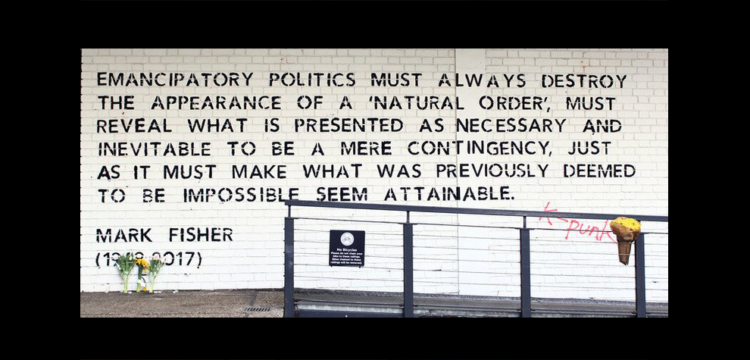Europe After Brexit
What lead UK to Brexit and how can we imagine another future from amidst the wreckage?
This essay is an excerpt from the book Shaping Desired Futures (NERO, 2018). Edited by Aria Spinelli, the book was published in the framework of the European cooperation project Trauma & Revival—Cultural Relations between Eastern and Western Europe in collaboration with BOZAR, Brussels.
Feelings of powerlessness abound. We are seemingly at the mercy of lies we can no longer differentiate from truths, or, perhaps even more seriously, we no longer know the difference between lying and speaking the truth in the first place. Perhaps this is a function or a consequence of the overwhelming stream of words, voices and images that tumult through our every day, and which we seem to be completely addicted to. Perhaps there has been a shift in politics, partly related perhaps to the problem of speed, in which serious investigation into untruths, truth-like statements, “truthiness,” fibbing, lying, misrepresentation and so on, are forever running behind, or non-existent. Meanwhile, our own political “position” is endlessly reinforced through repetition, the fear of being ostracized for “wrong-think,” and all of the other social games we must play in order to maintain our positive—or at least something that approaches the appearance of “positive”—participation in relationships of all kinds.
But tension, fear, and speed are poor conditions for thought and comprehension. We read more but faster and without depth. We move from one thing to the next without necessarily allowing insight to emerge. We feel increasingly powerless, but at the same time angry and frustrated with the state of the world, and of the political situation. Here I want to examine the “Brexit” debacle that has shaped British politics and Britain’s relationship to the EU over the past few years: What does it mean? How can we think about another future from amidst the wreckage?
The bridges on the euro banknotes are not real. Rather than depict existing bridges from member state countries, which could have led to accusations of favoritism and envy between countries, the bridges created by Austrian designer Robert Kalina are generic examples of various architectural styles from European cultural history: Classical Antiquity, the Roman period, the Gothic period, the Renaissance, Baroque and Rococo, iron and glass, and the twentieth century. In 2013, Dutch designer Robin Stam brought actual, physical versions of the seven bridges on the banknotes to life in Spijkenisse, Holland, right down to the color scheme. The bridges of the banknotes came to life as cyclist and pedestrian pathways across a housing estate river. They look comical, and slightly surreal, as if in a theme park. We’ll cross that bridge when we come to it.
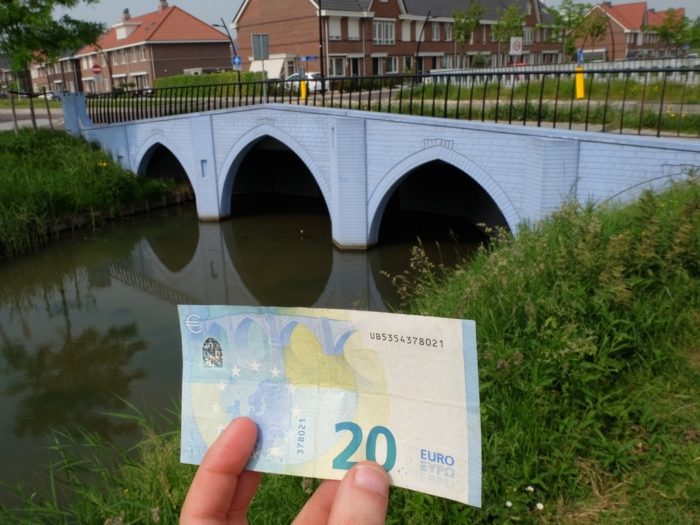
Euro Banknotes Bridges by Robin Stam, Netherlands
The UK never, of course, used the euro, preferring to keep the pound, with its royal face and patriotic symbols. The five economic tests for possible eventual acceptance of the currency, proposed by Gordon Brown under Tony Blair’s government, set the bar so high that many argued the euro could never be accepted, and that was even before Brexit reared its ugly head. The UK must be able to live with eurozone interest rates—the economic tests argued; the euro must be conducive to firms and individuals investing in the UK; the euro must maintain UK financial services’ competitive position internationally; it must promote higher growth and a long-term increase in jobs; and so on, and so on. Everything, in other words, must be conducive to the UK being treated in a “special” way compared to its European neighbors.
The same went for immigration and asylum rules, of course. The UK wanted exceptionality here too, demanding autonomous border controls and visa policy under Schengen. Not satisfied with its own version of protectionist capitalism and extra border controls, and under a permanent siege of anti-EU media stories (“They want us to legislate on the shape of bananas!”; “We’re not allowed to use our own measuring systems!”; “Brussels is a bunch of technocratic super-state authoritarians!”), the UK’s relation to Europe has always been hostile. To be clear, though, we are talking about England (and Wales) here primarily, and Englishness (and Welshness as unhappily subsumed into Englishness, as in the law), as both Scotland and Northern Ireland both opted to remain in the EU during the referendum.
So what did “Brexit” mean after all? The United Kingdom’s decision to leave the European Union in June 2016 represented the will of 51.9% of the electorate (which excluded EU citizens residing in Britain, the very people most affected by the vote). Of the 46.5 million people eligible to vote, 17.4 million voted to leave the EU, 16.1 million voted to stay, and 13 million people did not vote at all. It was, though, a referendum in many ways not about Europe. Instead, it was a series of often fantastical protests—against Westminster, against London, against global (rather than EU) immigration and asylum (often fused or confused by media and public alike), against all the main parties who pushed for Remain, against a perceived status quo, against perceived elites, and, in some cases, for sheer bloody-minded nihilism.
It should be noted that there was a leftist argument in the UK for leaving the EU (the so-called “Lexit” position). Many were angered by the EU’s treatment of Greece and other “poorer” member states and the imposition of austerity (of course the UK imposed austerity too, but it was exceptional version of it, and we did it to ourselves). Similarly, pointing out that the EU is fundamentally capitalist and racist, and pushing instead for a vision of a popularly sovereign, socialist UK that could draw upon the long, if mostly defeated legacy, of peasant and proletarian struggle, or, at least, a crisis in the ruling class was touted by some. As John Hilary, executive director of War on Want, put it, prior to the referendum: “No one on the Left claims that the EU is currently fit for purpose. If there was any doubt, the contempt shown to the people of Greece in 2015 when they called for a fair renegotiation of their debt confirmed that there is zero tolerance in Brussels for any challenge to the fiscal compact that underpins neoliberal capitalist rule. ‘Austerity Europe’ is the brutal regime imposed by the institutions of the EU on its peoples, just as ‘Fortress Europe’ is the face presented to those fleeing disaster on its borders.”
Similarly, post-referendum, Christopher Bickerton and Richard Tuck, both independent Left supporters of Brexit, write: “Defending popular sovereignty is not an anti-European view to take. The one who articulated this vision of sovereignty most clearly was the Genevan-born philosopher, Jean-Jacques Rousseau. The French Revolution best incarnated the translation of the idea of popular sovereignty into practice. The call for popular control over decision-making that has come out of the Brexit referendum is a European idea. It is one of the deep ironies of the EU referendum that opponents of Brexit take this very European act as the apotheosis of British anti-Europeanism.”
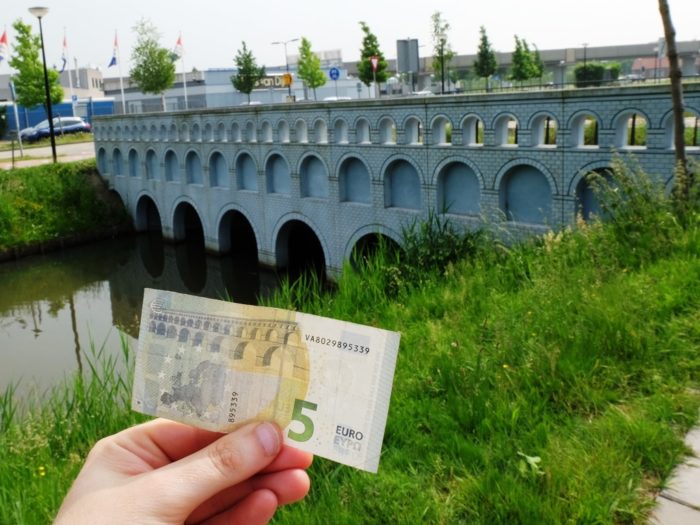
Euro Banknotes Bridges by Robin Stam, Netherlands
For Bickerton and Tuck, then, the Brexit vote was a positive vote for popular sovereignty, and the slogan “Take Back Control,” read by many as a racist dog-whistle regarding Britain’s already extremely tight borders, should be understood from the standpoint of a dispossessed majority. “[W]e have to realise that “control” means something very different for the poor and less educated from what it means for people in or on the fringes of the ruling class… For [the culturally and socially disadvantaged], the vote is still what it used to be in the great days of expanding democracy. It is the key means of assert- ing some kind of control over their rulers. Before the expansion of the franchise they could have done everything they are supposed to do now—lobby, debate, protest etc—but the poor understood then that without actual power all that would come to nothing for people like them. For those who lack the access to the professional and political networks that nowadays operate the levers of power, the vote is the only means they currently have to influence government. They do not need to be able to articulate this clearly for it to be true, and to be felt to be true by them at some instinctive level.”
Incidentally, the origins of the slogan “Take Back Control” are rather murky, though it was undoubtedly extraordinarily successful as a slogan, and was later, unsurprisingly, adopted by Trump. Its very vagueness combined with its forthrightness made it the perfect rallying cry for the leave campaign. However, we must question this otherwise noble account of the desire for sovereignty presented by Bickerton and Tuck: “the poor” here cannot but stand in for the white working class, given that 67% of Asian voters opted to remain, as did 73% of black voters. It would also be impossible to ignore the fact that vast amounts of leave campaigning centered around upping fears around immigration and asylum. As Satnam Virdee and Brendan McGeever explain:
“What often gets elided in discussions of Brexit is the presence of what we might term ‘internal others’ against whom the nation has often defined itself, including, most notably, racialized minorities and migrants … the [leave] campaign’s narrative was underscored by two contradictory but interlocking visions. The first was a deep nostalgia for empire, but one secured through an occlusion of the underside of the British imperial project: the corrosive legacies of colonialism and racism, past and present. The second was a more insular, Powellite narrative of retreating from a globalizing world that is no longer recognizably ‘British.’ What gave these visions such traction … was that they carefully activated long-standing racialized structures of feeling about immigration and national belonging. …Englishness is characterized by two inter-related phenomena. The first is a striking confluence between English national feeling and the longing for Empire. The ease with which both nation and empire can sit together, we suggest, is one of the salient but unspoken dimensions of Brexit and its racist aftermath. We locate the second characteristic of contemporary manifestations of Englishness in the structural decline that Britain has undergone during the neoliberal era. Experiences of downward mobility, alongside the persistence of class injuries, we contend, have produced a politics of nationalist resentment. Coming in the wake of a momentous working class defeat, Englishness has been reasserted through a racializing, insular nationalism, and it found its voice in the course of Brexit.”
Virdee and McGeever’s analysis reveals the absolutely kernel and heart of the mainstream leave campaign and the deliberate and unconscious “nostalgia for Empire” that right-wing leave campaigners and media pushed over and over again. Violence against those perceived to be non-British-citizens was massively ramped up in the climate before and around Brexit, with many street attacks against black people, Polish people, Muslims and others. In the month of the referendum, religious and racially motivated hate crimes in the UK increased by 41%. I remember the atmosphere in the fortnight before the vote—it is hard to put a finger on imperceptible changes in the political climate, but nevertheless, it was there, in the air, the feeling that “Oh shit, this is how fascism takes hold…”
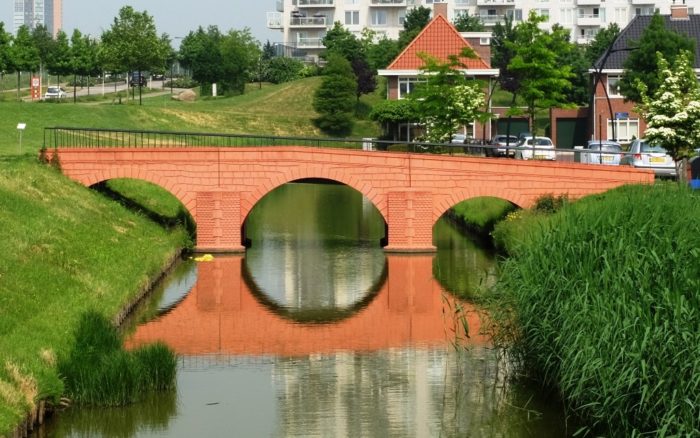
Euro Banknotes Bridges by Robin Stam, Netherlands
In Brexit as Nostalgia for Empire, written before the referendum, and in the same week that Jo Cox, a pro-immigration Labour MP, was murdered in the streets by a man who shouted “Britain First!” as he did so, Nadine El-Enany, a lecturer in EU law, similarly stresses that the run-up to the referendum “has shown Britain for what it is. Woodwork: the washed-up bracken of the British Empire, and the ugly flotsam of its legacy of racism.” And she continues: “From this woodwork the Brexiters have emerged. They have long romanticised the days of Empire when Britannia ruled the waves and was defined by its racial and cultural superiority… This referendum has not been about Europe, but about Britain and its imperial legacy. For Brexiters, turning their back on Europe and turfing out their neighbours is a step toward salvaging the shipwreck of the British Empire, which saw the exploitation of peoples, their subjugation on the basis of race, a system that was maintained through the brutal and systematic violence of the colonial authorities… A nostalgia for empire is no starting point for emancipatory struggle based on solidarity with the oppressed.”
As El-Enany further points out, and I agree: “[I]f Britain votes Leave [note: of course it did], it does so on the terms of the racist and xenophobic Brexit campaign. A Leave vote would provide a mandate for Brexit leaders to push for Fortress Britain, which already exists insofar as it can as an EU Member State. Britain is the most fortified of all EU countries. It is not part of Schengen. It has a flexible opt-out from all EU law on immigration and asylum, which it has consistently exercised to opt into restrictive measures that further strengthen its capacity to exclude and out of those aimed at enhancing protection standards.”
Speaking, then, as someone from the other side of Brexit—though what it means for anybody is not at all clear—but it’ll likely be terrible, particularly for EU citizens and non-EU migrants alike, whose situation is not at all guaranteed, it seems clear that in many ways the UK referendum on the EU was not in many ways about Europe—the simple “Yes” or “No” concealed a whole host of positions, many of which had nothing to do with Europe at all. The right-wing Brexit vote was ramped up by the UK Independence Party, and tabloids and nationalists took it as an opportunity to attack all migrants and refugees, regardless of origin. It was, as I and others have suggested, also a protest vote of sorts—against Westminster in general, against the south of the country, and against austerity.
But for the 48% of people who voted—often reluctantly—to stay in the EU, what does Europe mean? In many cases, not much more than slightly cheaper wine, not worrying about passport control too much. And what of the EU? It is interesting to hear the voice of Franco Bifo Berardi on this. In his resignation letter to the Democracy in Europe Movement from July 25 last year, he wrote the following: “[T]here is something flawed in our project of re-establishing democracy in Europe: this possibility does not exist. Democratic Europe is an oxymoron, as Europe is the heart of financial dictatorship in the world. Peaceful Europe is an oxymoron, as Europe is the core of war, racism and aggressiveness. We have trusted that Europe could overcome its history of violence, but now it’s time to acknowledge the truth: Europe is nothing but nationalism, colonialism, capitalism and fascism.”
In relation to the border crisis, Bifo writes: “With the exception of a minority of doctors, voluntary workers, activists and fishers who now are accused of being the abetters of illegal migrants, the majority of the European population [is] refusing to deal with their own historical responsibility.” I want to both agree and disagree with Bifo.
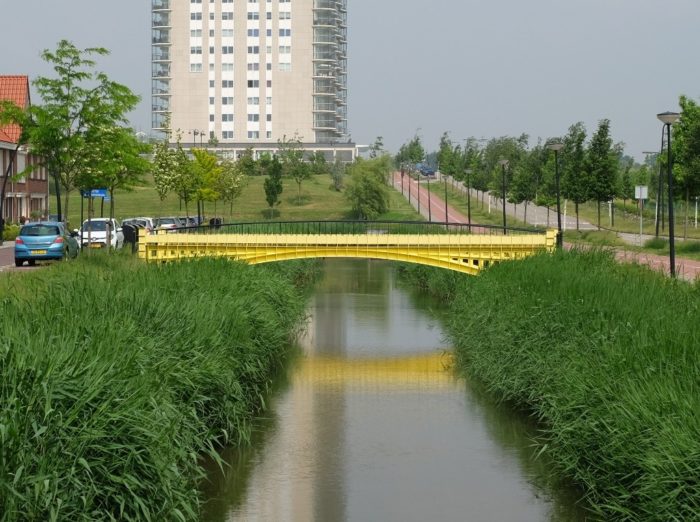
Euro Banknotes Bridges by Robin Stam, Netherlands
This raises the question of what a strong leftist position on Europe would look like today, seeing as the specter haunting it is no longer communism, but rather yet more right-wing, fascist, nationalisms. As anthropologist, geographer, and social critic Nicholas De Genova puts it: “Ever since Marx and Engels proclaimed in The Communist Manifesto that the workers have no country, it has been an elementary and defining premise of Marxist politics that we are internationalists.” How is it possible to reconcile this internationalism with the reality of Europe’s attitude towards borders and migrants, the reality that “the European Union (EU) has converted the Mediterranean into a mass grave,” as De Genova puts it? De Genova points out that the separation between “Europe” and refugees coming from “elsewhere” is politically and historically a false one: “[M]igrants arriving in Europe today, much as has been true for several decades, originate from places that were effectively mass-scale prison labour camps where their forebears contributed to collectively producing the greater part of the material basis for the prosperity, power and prestige of Europe historically.” Similarly, with those fleeing war zones in which Europe, with the US, are deeply involved. “The question of Europe,” he states, “itself has become inextricable from the question of migration.”
Europe is fascism and colonialism but it is also Marxism, revolutionary egalitarianism, internationalism, radical democracy, and existentialism.
It is this question of the “material basis” for the prosperity, power, and prestige of Europe that I want to—somewhat bluntly—invoke here. This is a question of geography, of climate change largely created by the West but suffered by the global South, but it is also a question of material resources. Simply put, what is it that Europe has? We can point to vast quantities of wealth in the form of money (and indeed, bridges based on money), vast amounts of riches, of property, of stuff. There are millions of empty buildings and spare rooms where refugees could stay. Of course, this property is private, which looks unlikely to change any time soon. Nevertheless, as naïve as this attempt to inventory what there is, and how it could be shared, might seem, I do not see how else we might reconfigure how we imagine Europe could be, and how it could actually do some good in the world. We need boats to ferry people away from the Western-backed and Western-caused wars, away from climate change, and away from repressive regimes. We need the abolition of borders and the abolition of laws against “people-trafficking.” I am interested in the renewed call for an internationalist humanism that has at its root the existentialist insight that while you cannot choose where you are born, it is nevertheless a matter of contingency that one is born at all—let alone born in a particular place.
Against the far-right politics of identity, of blood and soil, I want to propose an internationalism of accident, of anti-identity, anti-blood, anti-soil. I therefore propose that Europe should not only open borders, ensure safe passage for anyone who wants to come here, but also take collective stock of all of the resources, riches, wealth, and land with a view to redistributing everything. It is not that there is not enough room in Europe for many more people, or that there is not enough wealth to go around. There is more than enough; it is that it is being held captive by a tiny minority who benefits from creating a fantasy image of scarcity of all kinds—spatial, sexual, cultural, etc.
Europe is fascism and colonialism but it is also Marxism, revolutionary egalitarianism, internationalism, radical democracy, and existentialism. How might we inventory what Europe possesses? It may be that we need, in the first place, to reconfigure the basis on which we regard humanity as a whole, and ourselves as bearers of a shared humanity. Just as it is always the poorest who are the most generous, we need to undo the psychic damage caused by the ideology of Thatcherism and neoliberalism, which stresses selfishness, greed and individualism. We can see the damage done in terms of widespread depression, loneliness, and alienation. We have come to see each other as disposable, as market -objects, as commodities to be used and then gotten rid of. The rhetoric of racism and xenophobia pushes the false idea of lack at all levels—there isn’t enough room, there isn’t enough money, there isn’t enough enjoyment. What we need to say is that there are all of those things in large quantities, but they are simply distributed in completely unfair ways. Richer parts of Western countries can redistribute wealth both within each particular country, and outside it. There is no reason why anybody should have something they don’t need when it would be better suited to somebody who does.
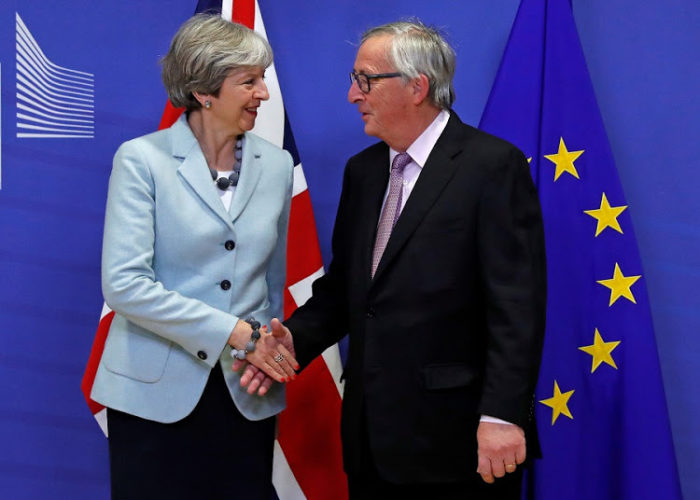
Britain’s Prime Minister Theresa May and European Commission President Jean-Claude Juncker
I wonder if part of this contingent, existential, negative, communist universalism could mobilize the concept of shared collective death in order to undermine the idea of a separation within humanity (“them” and “us”). We will all die, and we will be able to do as little with wealth in death as we can do in life, if we merely hold on to it. The relationship between this redistributive idea predicated on death and universalism may not be “communist” in the classic sense—indeed it owes a lot to a kind of existentialism fused with utilitarianism. But the question of how we identify the wealth that exists when those that have the most are determined to hide both it and themselves is an eminently material one, as is the way in which we might liberate this wealth such that we direct it towards need, and not towards the preservation of existing inequalities. Perhaps this is, in the first place, an imaginative exercise, an exercise in speculative fiction. Yet it is possible to imagine what could practically happen, and think from that position onwards, even where “reality” gets in the way.
At the moment, in the place of communist internationalism, we have the rise of new nationalisms that seek to foreclose on individuality, that seek to claim that there is some inherent tie between one’s contingent identity as a being in a certain place and a certain time and the political geography that names you. It is a limited, fearful, and angry subject-formation that denies both the possibility of individuality in the other, but also denies the necessity of group solidarity and action. Whatever Brexit holds in store for Britain and the EU as a whole, there remains an extra-territorial demand to return to internationalism, politically, philosophically, and practically. We have already failed for too long to confront and slay the remnants of the fetishization of empire, but also the fetishization of Europe’s supposed “singularity.” Britain is not special, and neither is Europe. What they both have, though, is a lot of ill-gotten stuff and land that can and must be redistributed. May all the pounds with their sovereigns and all the euros with their bridges be reparated to all those whose labor and resources constructed them in the first place.



